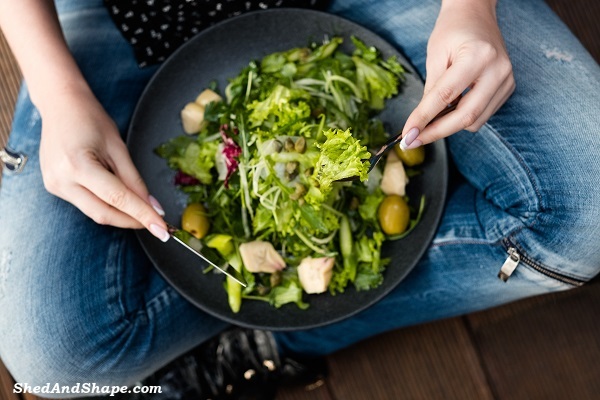Do you need fiber on keto? Absolutely! Adding fiber-rich foods into your diet can be very beneficial to your health and is very important for any diet.
Since most fiber-rich foods contain carbs, it’s not surprising that a lot of keto dieters avoid it. As a high-fat, low-carb diet, the ketogenic diet restricts the consumption of carb-loaded foods, including fiber-rich ones. Unfortunately, not getting enough fiber can lead to various health problems.
So, how do you add fiber on keto without ruining your diet? Let’s find out more about this and understand why fiber is so important on keto.
What Is Fiber?
Fiber, also known as roughage, is a type of carbohydrate that the body cannot digest. It’s often found in plants, such as fruits, vegetables, grains, and legumes. Unlike other carbs, fiber is not broken down into digestible molecules. Therefore, it is relatively intact as it passes through our intestinal tract.
There are two types of fiber:
- Soluble fiber – this is the type of fiber that gets dissolved in water and can be metabolized by the good bacteria that’s in the gut.
- Insoluble fiber – this is the type of fiber that does not dissolve in water. It adds bulk to the stools.
Fiber is important in so many ways. It aids in the removal of waste through your colon, which is important in maintaining healthy digestion. Aside from improving your digestion, fiber helps with weight management, regulation of blood sugar level, and more.
Some health experts also link fiber to the longevity of life and in minimizing one’s risk of developing cancer.
In the keto diet, fiber plays a very important role. According to New York Times bestselling author Naomi Whittel, an advocate of the high-fat, low-carb regimen:
“If you don’t get enough fiber, you don’t get all the benefits of nutritional ketosis. Consuming fiber while on keto can speed up your metabolism, balance your hormones, and keep you feeling full.”
How Much Fiber Do You Need on Keto?
According to the American Heart Association the recommended amount of fiber for health on a normal diet is 25 to 30 grams a day. Shockingly, on average, American adults eat just 10 to 15 grams of total fiber per day which is way below what they should be eating.
Harvard Health states that researchers found that reduction of health risks were greatest on a diet that included fiber between 25 and 29 grams.
When on a keto diet you don’t need so much fiber because your glycemic control is better as you reduce the carbohydrate foods that cause blood sugar spikes. Start with around 15-20 grams a day of mixed soluble and insoluble fiber for a few weeks to see how you feel.
After that you can try increasing the fiber gradually by around 3 grams a time until you are having good daily bowel movements and no adverse symptoms.
Don’t forget to drink plenty of water as well or the fiber will absorb water from the bowel and cause constipation.
How to Add Fiber on Keto?
The keto diet requires dieters to avoid eating carbs. By restricting carb consumption, the body will transition into the state of ketosis where it uses fats as energy.
But, due to the strict intake of carbs followers of the keto way of eating often end up consuming very little whole food fiber, which wreaks havoc on their digestive system. So how do you incorporate fiber on keto?
The key to getting your fiber on a keto diet is to focus on eating plenty of non-starchy vegetables, seeds, nuts, and berries. Avoid eating traditional high fiber foods such as legumes, grains, and beans since they are often loaded with carbs.
Below is a list of low-carb fibrous whole foods that health experts recommend to be added to a keto or any low-carb diet.
- All leafy green vegetables
- Cruciferous vegetables, such as cauliflower, broccoli, Brussels sprouts, cabbage, and kale
- Almonds
- Artichoke
- Asparagus
- Avocado
- Bok choy
- Chia seeds
- Cucumber
- Flax seed
- Hemp seeds
- Lettuce
- Low-sugar berries, such as wild blueberries
- Nuts and seeds
- Tomato
- Walnuts
- Zucchini
So you see there is plenty of foods that can help supply the fiber you need. Always consider the carbohydrate content of every fiber-rich food that you eat and plan the portion accordingly so you won’t be kicked out of ketosis.
Why Is Fiber Important on Keto?
Eating fiber on keto delivers a slew of health benefits. The keto diet itself is already beneficial to our health, so you can reap even more health benefits if you add some fiber to your eating plan.
It might be challenging since you have to make sure that you don’t go beyond your daily carb limit, but doing so is definitely worth it. Below are some reasons why adding fiber to keto is important.
Related reading: How Many Carbs Do You Need To Eat To Lose Weight?
1. Slows down digestion
As mentioned, fiber is available in two different types, soluble and insoluble. Both types of fiber are important for our health, digestion, and the prevention of certain diseases, including diabetes.
Related reading: Is the Keto Diet Good for Diabetes?
The soluble fiber attracts water and will be converted into a gel, which slows down the process of digestion. This process also slows down the digestion rate of other nutrients including carbs.
Because of this, health experts believe that eating meals with fiber-rich foods are less likely to trigger a sharp spike in blood sugar level. Although the keto diet itself can help minimize blood sugar spikes, adding fiber to your diet can further lower your risk of getting diabetes.
2. Increases Satiety
Fiber has also been found to help increase satiety, which is beneficial for weight loss. In a 2011 review article that was published in Obesity Reviews, it concluded that a greater intake of dietary fiber might help to reduce a person’s appetite by 5%, decrease energy intake by 2.6%, and lower body weight by 1.3%.
A decrease in appetite can lead to an increase in satiety, which prevents unhealthy cravings. If you’re trying to lose weight on a keto diet, then feeling full and satisfied when you eat a meal can help you to achieve your weight loss goal.
Related reading: How A Low Carb Diet Keeps Your Appetite Under Control
3. Prevents Constipation
Perhaps, one of the biggest benefits of eating fiber on keto is in preventing constipation. Constipation is one of the most common side effects of the keto diet, especially during the initial stage.
There are many reasons behind constipation in keto, but one of the biggest reasons is the lack of fiber. Fiber helps you to maintain a regular bowel movement because it increases the water content of your stool, which has a laxative effect. By eating enough fiber and drinking enough water on keto, constipation can be prevented.
4. Feeds the Gut Bacteria
Not having enough fiber on keto could harm the health of your gut microbiome. This could potentially increase inflammation and reduce the concentration of good bacteria. A good diverse gut microbiome is crucial for the various aspects of our health.
Related reading: Is A Low Carb Diet Bad For Your Gut Bacteria?
Most of the fats and protein that you eat on keto gets absorbed into the bloodstream and won’t make it to the large intestine, which leaves little for the gut bacteria. By adding fiber into your keto diet, you will be providing food to these bacteria, which can help to improve your overall health.
Final Thoughts
From what I learn in various online keto health groups many keto dieters don’t recognize the importance of eating fiber on the diet. Even though most fiber-rich foods are carbs, and this is not good for keto, you should make an effort to add as much fiber from low carb foods as possible.
As you transition from a high-carb to an extremely low carb diet, you could find yourself suffering from constipation and other unwanted symptoms. This can bring extreme discomfort that you might not want to continue with your diet. So to avoid this, try to eat enough fiber on keto from the start.










